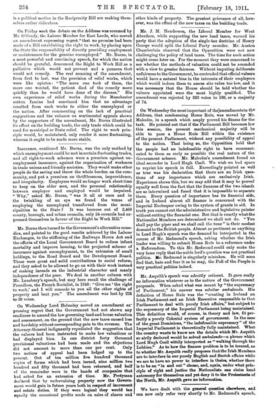Insurance, continued Mr. Burns, was the only method by which
unemployment could be met in certain fluctuating trades, and all right-to-work schemes were a premium against un- employment insurance, against the organisation of workmen in trade unions and friendly societies. They would make other people do the saving and throw the whole burden on the com- munity, and put a premium on thriftlessness, improvidence, and irregularity. Employers would no longer work short time to keep on the older• men, and the personal relationship between employer and employed would be impaired. " Why," asked Mr. Burns, " was it all at once and in the twinkling of an eye we found the venue of employing the unemployed transferred from the muni- cipalities to the State ? It was because out of 2,468 county, borough, and urban councils, only 24 councils had ex- pressed themselves in favour of the Right to Work Bill."






































 Previous page
Previous page